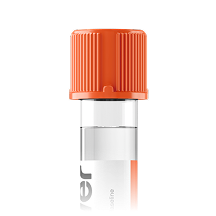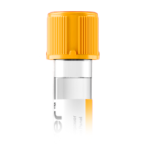Key Benefits
- Check for hyperthyroidism and thyroid autoimmunity when Graves disease is suspected.
- Spot thyroid overactivity; low TSH with high Free T4 flags hyperthyroidism.
- Explain symptoms like palpitations, anxiety, tremor, and weight loss by linking hormones.
- Flag autoimmune thyroid disease; TPO or Tg positivity supports autoimmunity, not specific to Graves.
- Guide treatment and tracking; TSH and Free T4 inform urgency and response.
- Protect fertility; correcting thyroid imbalance improves ovulation, libido, and lowers miscarriage risk.
- Support pregnancy; manage overt hyperthyroidism and monitor TPO-positive women more closely.
- Clarify interpretation; read with symptoms, Free T3, and TSH-receptor antibodies.
What are Graves’ Disease biomarkers?
Graves’ disease biomarkers are blood clues that show two things: how fast the thyroid engine is running and what’s pressing the gas pedal. The hallmark is antibodies against the thyroid’s on-switch, the TSH receptor (TSH receptor antibodies, TRAb; thyrotropin receptor antibodies). The stimulating type (thyroid-stimulating immunoglobulins, TSI) binds this receptor and continuously tells the gland to release hormone. Detecting these antibodies confirms an autoimmune driver and helps distinguish Graves’ disease from other causes of an overactive thyroid. Hormone measures—thyroxine and triiodothyronine (free T4 and T3)—show how much thyroid signal is reaching the body, while the pituitary messenger (thyroid-stimulating hormone, TSH) reflects the brain’s feedback to the gland. Read together, these markers map cause and effect: an immune signal pushing the receptor, a gland producing hormone, and the body responding. Because the same receptor is present in tissues around the eyes, these antibodies also connect the thyroid process to eye symptoms in Graves’ orbitopathy. In short, Graves’ biomarkers turn symptoms into a clear, objective picture that guides diagnosis, monitoring, and treatment.
Why is blood testing for Graves’ Disease important?
Graves’ disease turns the thyroid’s “metabolic throttle” too high, speeding the heart, burning energy, and amplifying brain, muscle, bone, and reproductive signals. Blood tests quantify that throttle and identify the autoimmune driver, letting us see how far the whole system has shifted and which organs are at risk.For most people, TSH sits around 0.4–4 and Free T4 around 0.8–1.8, with “feel-best” values often near the middle. In Graves’, TSH is typically suppressed and Free T4 rises. Thyroid peroxidase antibodies (TPO Ab) and thyroglobulin antibodies (Tg Ab) are ideally negative or as low as possible; when elevated, they mark thyroid autoimmunity. Graves‑specific TSH receptor antibodies (TRAb/TSI), when present, point to active, stimulating autoimmunity and help forecast eye involvement and pregnancy risks.When values go low in the pituitary signal, a very low TSH means the brain senses too much thyroid hormone. People often notice pounding or irregular heartbeats, anxiety, tremor, heat intolerance, unintended weight loss, diarrhea, and sleep disruption; women may have lighter or irregular periods and reduced fertility, men can lose muscle and libido, and older adults are prone to atrial fibrillation and heart failure. If Free T4 falls below range (for example during overtreatment), the body shifts toward slowness—fatigue, cold sensitivity, constipation, and depressed mood.When hormones run high, a high Free T4 confirms overt hyperthyroidism; persistently high antibodies signal ongoing immune activation, even if symptoms ebb.Big picture: these biomarkers map how thyroid autoimmunity intersects with the heart, brain, bone, metabolism, eyes, and pregnancy. Tracking them links day‑to‑day symptoms to long‑term risks such as arrhythmias, bone loss, and adverse pregnancy outcomes, guiding safe monitoring over time.
What insights will I get?
Graves’ Disease blood testing provides a window into how your thyroid system is functioning, which is central to energy production, metabolism, heart rhythm, cognitive clarity, reproductive health, and immune balance. At Superpower, we assess four key biomarkers: TSH (thyroid-stimulating hormone), Free T4 (free thyroxine), TPO Ab (thyroid peroxidase antibodies), and Tg Ab (thyroglobulin antibodies). Together, these markers help us understand the underlying activity and stability of your thyroid and immune systems.TSH is a hormone produced by the pituitary gland that signals the thyroid to make hormones. In Graves’ Disease, the immune system mistakenly stimulates the thyroid, often causing TSH to drop below normal while Free T4 rises above normal. Free T4 is the main active thyroid hormone circulating in your blood, directly influencing how your body uses energy. TPO Ab and Tg Ab are antibodies that reflect immune system activity against thyroid proteins; their presence supports the diagnosis of autoimmune thyroid disease, including Graves’ Disease.When TSH is low and Free T4 is high, it suggests the thyroid is overactive (hyperthyroidism), which can disrupt metabolic stability, heart function, and mental focus. Elevated TPO Ab and Tg Ab indicate ongoing immune involvement, which can affect the long-term health and resilience of the thyroid system.Interpretation of these biomarkers can be influenced by factors such as pregnancy, age, acute illness, certain medications, and differences in laboratory methods. These variables are important to consider for an accurate understanding of your thyroid health.


.svg)








.avif)



.svg)





.svg)


.svg)


.svg)

.avif)
.svg)










.avif)
.avif)



.avif)







.png)